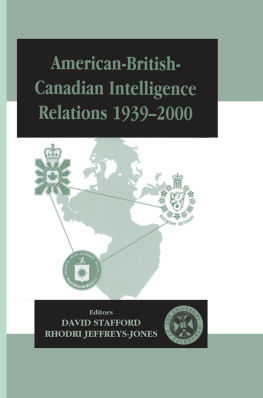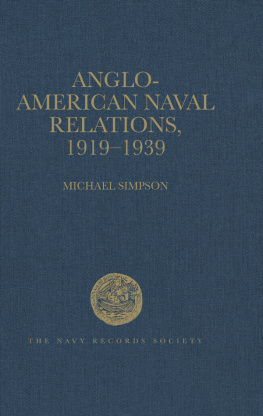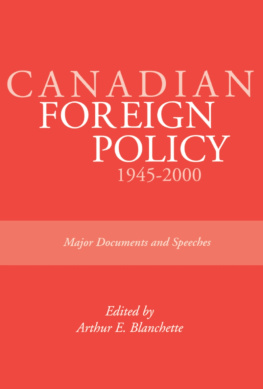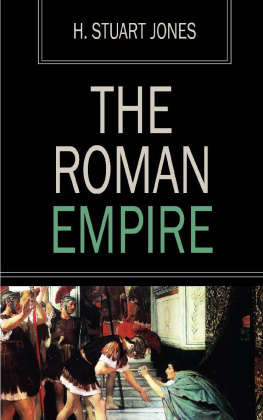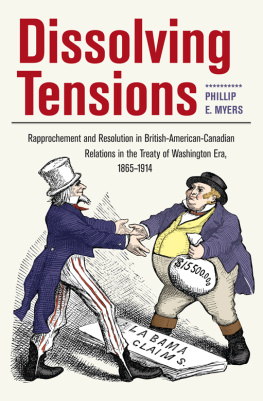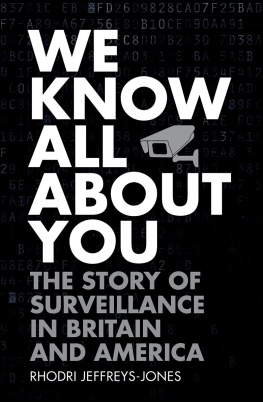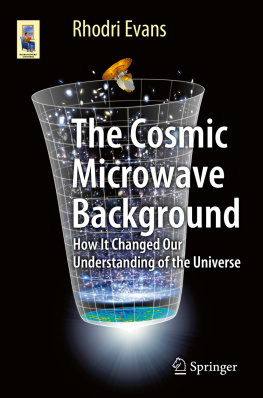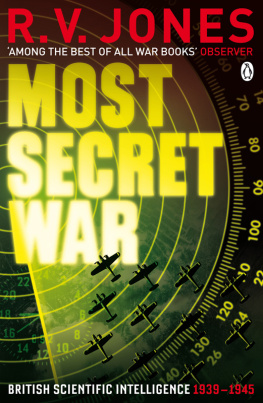Jeffreys-Jones Rhodri - American-British-Canadian intelligence relations 1939-2000
Here you can read online Jeffreys-Jones Rhodri - American-British-Canadian intelligence relations 1939-2000 full text of the book (entire story) in english for free. Download pdf and epub, get meaning, cover and reviews about this ebook. City: Canada., Great Britain., United States., year: 2013, publisher: Routledge, genre: Politics. Description of the work, (preface) as well as reviews are available. Best literature library LitArk.com created for fans of good reading and offers a wide selection of genres:
Romance novel
Science fiction
Adventure
Detective
Science
History
Home and family
Prose
Art
Politics
Computer
Non-fiction
Religion
Business
Children
Humor
Choose a favorite category and find really read worthwhile books. Enjoy immersion in the world of imagination, feel the emotions of the characters or learn something new for yourself, make an fascinating discovery.
- Book:American-British-Canadian intelligence relations 1939-2000
- Author:
- Publisher:Routledge
- Genre:
- Year:2013
- City:Canada., Great Britain., United States.
- Rating:3 / 5
- Favourites:Add to favourites
- Your mark:
- 60
- 1
- 2
- 3
- 4
- 5
American-British-Canadian intelligence relations 1939-2000: summary, description and annotation
We offer to read an annotation, description, summary or preface (depends on what the author of the book "American-British-Canadian intelligence relations 1939-2000" wrote himself). If you haven't found the necessary information about the book — write in the comments, we will try to find it.
American-British-Canadian intelligence relations 1939-2000 — read online for free the complete book (whole text) full work
Below is the text of the book, divided by pages. System saving the place of the last page read, allows you to conveniently read the book "American-British-Canadian intelligence relations 1939-2000" online for free, without having to search again every time where you left off. Put a bookmark, and you can go to the page where you finished reading at any time.
Font size:
Interval:
Bookmark:

CASS SERIES: STUDIES IN INTELLIGENCE
(Series Editors: Christopher Andrew and Michael I. Handel;
Wesley K. Wark and Richard J. Aldrich)
ISSN 1368-9916
American-British-Canadian Intelligence Relations 19392000
Also in this series
The Clandestine Cold War in Asia, 1945-65 edited by Richard J. Aldrich, Gary Rawnsley and Ming-Yen Rawnsley
Allied and Axis Signals Intelligence in World War II edited by David Alvarez
The Norwegian Intelligence Service 1945-1970: Northern Vigil by Olav Riste
British Military Intelligence in the Crimean War, 1854-1856 by Stephen Harris
Intelligence and the Cuban Missile Crisis edited by James G. Blight and David A. Welch
Knowing Your Friends: Intelligence Inside Alliances and Coalitions from 1914 to the Cold War edited by Martin S. Alexander
Eternal Vigilance? 50 Years of the CIA edited by Rhodri Jeffreys-Jones and Christopher Andrew
Nothing Sacred: Nazi Espionage Against the Vatican, 1939-1945 by David Alvarez and Revd Robert A. Graham
Intelligence Analysis and Assessment edited by David Charters, A. Stuart Farson and Glenn P. Hastedt
Intelligence and Imperial Defence: British Intelligence and the Defence of the Indian Empire 1904-1924 by Richard J. Poppelwell
Espionage: Past, Present, Future? edited by Wesley K. Wark
Codebreaker in the Far East by Alan Stripp
American-British-Canadian Intelligence Relations 19392000
Editors
DAVID STAFFORD
RHODRI JEFFREYS-JONES
(University of Edinburgh)

First published 2000 by Frank Cass Publishers
This edition published 2013 by Routledge
2 Park Square, Milton Park, Abingdon, Oxon 0X14 4RN
711 Third Avenue, New York, NY 10017
Routledge is an imprint of the Taylor & Francis Group, an informa business
Copyright 2000 Frank Cass & Co. Ltd.
British Library Cataloguing in Publication Data
American British Canadian intelligence relations, 19392000. (Studies in intelligence)
1. Security, International 2. Intelligence service Great Britain History 20th century 3. Intelligence service United States History 20th century 4. Intelligence service Canada History 20th century 5. Great Britain Foreign relations United States 6. United States Foreign relations Great Britain 7. Great Britain Foreign relations Canada 8. Canada Foreign relations Great Britain 9. Canada Foreign relations United States 10. United States Foreign relations Canada I. Strafford, David II. Jeffreys-Jones, Rhodri
ISBN 0 7146 5103 6 (cloth)
ISBN 0 7146 8142 3 (paper)
ISSN 1368-9916
Library of Congress Cataloging-in-Publication Data
American British Canadian intelligence relations, 19392000 / editors, David Stafford, Rhoddri Jeffreys-Jones.
p. cm. (Cass series studies in intelligence, ISSN 1368-9916)
From a colloquium held at the Institute for Advanced Studies in the Humanities at the University of Edinburgh, 1999.
Includes bibliographical references and index.
ISBN 0-7146-5103-6(cloth) ISBN 0-7146-8142-3 (pbk.)
1. Intelligence service United States Great Britain Case studies. 2. Intelligence service Canada Case studies. 3. Intelligence service Great Britain Case studies. I. Stafford, David. II. Jeffreys-Jones, Rhodri. III. Series.
JK468.16 A838 2000
327.12 dc21
00-043189
A catalog record for this book is available from the Library of Congress
This group of studies first appeared in a Special Issue on American-British-Canadian Intelligence Relations 1939-2000 of Intelligence and National Security 15/2 (Summer 2000) published by Frank Cass (ISSN 0268-4527).
All rights reserved. No part of this publication may be reproduced, stored in or introduced into a retrieval system or transmitted in any form, or by any means, electronic, mechanical, photocopying, recording, or otherwise, without the prior written permission of the publisher of this book.
Contents
Rhodri Jeffreys-Jones and David Stafford
Rhodri Jeffreys-Jones
Roderick Bailey
David Stafford
Stephen Budiansky
Paul Maddrell
W. Scott Lucas and Alistair Morey
James G. Hershberg
Reg Whitaker
Bruce Craig
Stuart Farson
Douglas Charles
This collection of essays originated in a colloquium held at the Institute for Advanced Studies in the Humanities (IASH) at the University of Edinburgh on 1 May 1999. Neither the colloquium nor the publication would have been possible without the generous support of the universitys Faculty of Arts. The editors are grateful to the Dean of the Faculty, Dr Frances Dow, for her initiative in making funds available for the special project, and for her constant encouragement and support throughout. The Director of IASH, Professor Peter Jones, facilitated the project and chaired the colloquium, and the Secretary of IASH, Mrs Anthea Taylor, ran the practical side of the colloquium with supreme efficiency. Once the colloquium was over, Professor Wesley Wark of the University of Toronto, then a Fellow at IASH, helped the editors to choose contributors to the projected volume. Another colloquium participant, the intelligence historian Ralph Erskine, also generously made several valuable suggestions both in Edinburgh and after his return to Northern Ireland. The editors are thankful to all these individuals, as they are to Mr Randal Gray for guiding their project through the publication process at Frank Cass.
RHODRI JEFFREYS-JONES and DAVID STAFFORD
In his contribution to this volume, Stephen Budiansky quotes a letter home from a British intelligence officer who had arrived in Washington in July 1942:
You must have noticed yourself how very many childish qualities the American male has: his taste in women, motor-cars, and drink, his demonstrative patriotism, his bullying assertion of his Rights . Hell! anyone would think I didnt like them.
Later in his essay, he notes the reaction of an American counterpart a few years later: What we ultimately want is independence.
As even these brief illustrations reveal, the American-British intelligence relationship is not just interesting, but complex. If you add Canada to the formula, giving the acronym ABC, both the complexity and significance of the North Atlantic intelligence triangle become still more evident. Yet, perhaps because of the deterring effect of complexity, ABC intelligence is an underexplored subject in spite of its intrinsic interest. True, as shown in Doug Charless historiographical contribution to this volume, scholarship on the ABC intelligence relationship is moving beyond its primitive, hero-worshipping stage. Instead of focusing on the real or dubious claims made for charismatic individuals, notably the Canadian William Stephenson who strove to further British-American wartime cooperation, historians have now broadened the base of their enquiries to look at problems such as cooperation in codebreaking. But the study of bilateral intelligence relations, let alone the triangular relationship, remains in its infancy.
Nevertheless, research is under way and, as documents continue to be declassified, it will no doubt gather pace. The purpose of this collection of essays is to give an airing to some of the scholarship currently in progress on various dimensions of the ABC relationship. The aim is to open up further an important field, to sort out some of the myths from the realities, to enquire into the functions of those myths, and to ventilate some hypotheses. A final objective is to bring to the fore, in the company of some senior scholars, the work of members of the new and rising generation such as Douglas Charles and Roderick Bailey.
Next pageFont size:
Interval:
Bookmark:
Similar books «American-British-Canadian intelligence relations 1939-2000»
Look at similar books to American-British-Canadian intelligence relations 1939-2000. We have selected literature similar in name and meaning in the hope of providing readers with more options to find new, interesting, not yet read works.
Discussion, reviews of the book American-British-Canadian intelligence relations 1939-2000 and just readers' own opinions. Leave your comments, write what you think about the work, its meaning or the main characters. Specify what exactly you liked and what you didn't like, and why you think so.

